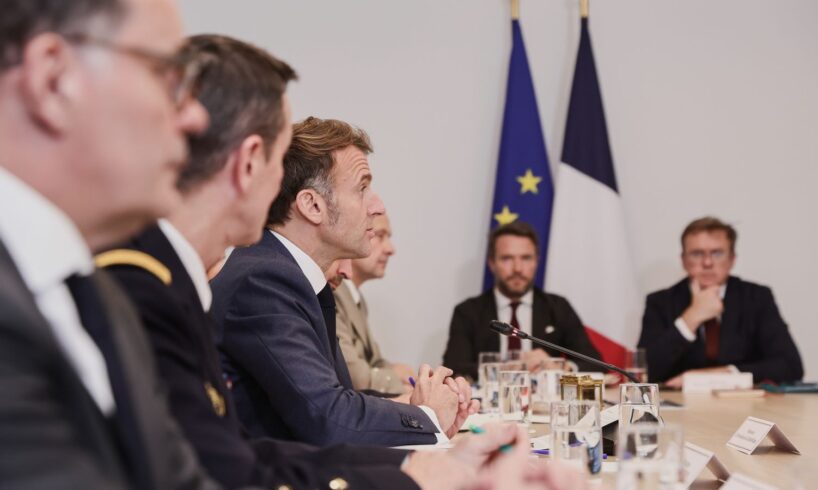
Elevenlabs AudioNative Player
US President Donald Trump’s attempt to negotiate a settlement of the US-NATO war with Russia by striking a deal with Moscow has met with fierce resistance in Europe and is destroying the transatlantic alliance with the US. The days when the US was considered a “partner” are irrevocably over.
Trump has “finally ruined America’s reputation as a reliable and reasonable ally,” wrote Berthold Kohler, editor of the German daily F.A.Z. The fact that Kiev now has to kowtow to Trump is “the punishment for having been grossly negligent in ensuring its own security by making itself dependent on an unreliable partner.” French President Macron was right “in calling for strategic autonomy,” which must now be pursued much more consistently.
French President Emmanuel Macron, third left, attends a video conference of the ‘Coalition of the Willing’ on Ukraine at the Elysee Palace in Paris, France, Tuesday, Nov. 25, 2025 [AP Photo/Teresa Saurez]
There is agreement on this in the most important European capitals. But the pursuit of “strategic autonomy”—the building of armed forces that are equal to the formidable American military machine and capable of continuing the war against Russia—is incompatible with the social conditions that have long dampened class antagonisms in Europe. It puts fierce class struggles on the order of the day.
“Strategic autonomy” requires the transfer of gigantic sums from social to military budgets, the destruction of hundreds of thousands of jobs in the international trade war and the reintroduction of conscription. Parents must once again prepare to “lose their children,” as French army chief Mandon recently said. In short, “strategic autonomy” requires the “Trumpisation” of Europe.
Leon Trotsky wrote in the 1920s: “American capitalism, in driving Europe more and more into a blind alley, will automatically drive her onto the road of revolution. In this is the most important key to the world situation.” And he warned: “In the period of crisis the hegemony of the United States will operate more completely, more openly, and more ruthlessly than in the period of boom.”
The Wall Street Crash of 1929 did indeed plunge Europe into a revolutionary crisis, as Trotsky had predicted. But the working class was defeated first in Germany, then in France and Spain, because the social democratic and Stalinist mass parties proved incapable of providing revolutionary leadership. The result was the catastrophe of World War II.
After the war, the United States rescued European capitalism, which had been completely discredited. At that time, the German bourgeoisie sat covered in blood from head to toe on the ruins of the war it had instigated. The bourgeoisie of Italy and France had collaborated closely with the Nazis. There was a widespread conviction among the working class that capitalism had failed and had to be abolished.
Two factors prevented the overthrow of European capitalism. The first was the Stalinist bureaucracy in Moscow, which used its influence over the Communist parties to nip any revolutionary initiative in the bud. The second was the US, which needed Western Europe as a bulwark in the Cold War against the Soviet Union and as a market for its products, and helped European capitalism back on its feet with the Marshall Plan.
Today, the US is not a stabilising factor in world politics but the greatest destabilising factor. The richest country in the world has become the most indebted. American imperialism is trying to extricate itself from its crisis by imposing punitive tariffs on opponents and allies, threatening them militarily and declaring war on its own working class. This did not begin with Trump but with Ronald Reagan. It continued under Democratic and Republican successors and has reached a new dimension with Trump.
The crisis of US imperialism is not only driving American but also European society towards a revolutionary confrontation. As Trotsky wrote a hundred years ago, “American capitalism is revolutionising overripe Europe.” The social mechanisms and political institutions that restrained the class struggle in the past are collapsing under the pressure of American punitive tariffs, the profit demands of the financial markets, and the enormous costs of rearmament.
Good education, adequate healthcare, high wages and secure pensions are things of the past. Reformist unions and parties have turned themselves into stooges of capital. Pseudo-left parties such as Syriza in Greece, Podemos in Spain, the Left Party in Germany—and Mamdani in New York—fall into line as soon as they are elected to government office.
The bankruptcy of the social reformist parties has allowed right-wing demagogues to capitalise on growing discontent. But that is beginning to change. The mass protests against Macron’s pension reforms in France, the large demonstrations against the Gaza genocide in Britain and Spain, and the current general strikes in Belgium, Italy and Portugal demonstrate this.
This movement does not yet have a revolutionary character. It is dominated by traditional trade unions, syndicalist grassroots unions and pseudo-left groups. It remains stuck in the illusion that pressure can force the ruling class to change course. But workers and young people are learning fast. The failure of protest politics makes them receptive to a revolutionary, socialist perspective—if it is systematically fought for.
Mehring Books
Sounding the Alarm: Socialism Against War
These speeches provide a Marxist analysis of the relentless escalation of imperialist militarism over the past decade.
For European and especially German imperialism, the war against Russia is a key strategic issue. As long as the European imperialists have the world’s largest nuclear arsenal at their backs, it is difficult for them to pursue their global imperialist ambitions. Russia also has valuable raw materials. Hitler had already declared the conquest of “living space in the East” to be his most important foreign policy goal. The war also serves domestic political purposes—the militarisation of the entire society in preparation for fierce class struggles.
But even the most hawkish figures agree that without American support, the war against Russia cannot be continued, let alone won, at least not in the next three to five years. Hence the bitterness over American “betrayal” and the pace at which European rearmament is being pushed forward.
The conflict with the US is not welding Europe together but exacerbating rivalries between the European powers. The reconciliation between the “arch-enemies” Germany and France, which fought three costly wars against each other within 75 years, was less due to the insight of Adenauer and de Gaulle than to pressure from the US. Today, Paris and Berlin agree on rearmament and continuing the war against Russia—but neither wants to cede leadership in Europe to the other.
A deal between Putin and Trump would not end the Ukraine conflict. It would only be another step on the road to a third world war. Real peace can only be achieved through the independent intervention of the international working class to put a stop to all warmongers.
The struggle against layoffs, wage and social cuts, the defence of democratic rights and the fight against war are inseparably linked. Workers must abandon the illusion that moral appeals or political pressure can dissuade the ruling class from its course. It is impossible to seriously fight against war without putting an end to the dictatorship of finance capital and the capitalist economic system, which is the root cause of militarism and war.
This requires a complete break with all parties and organisations that defend capitalism and the building of a party that unites the working class of all countries and nationalities in the struggle for a socialist society—the Socialist Equality parties and the International Committee of the Fourth International.
I would like to join the Socialist Equality Party
We will follow up with you about how to start the process of joining the SEP.





